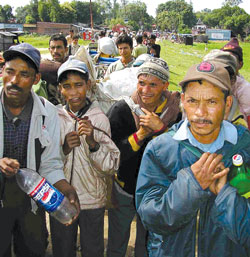|
|
They come in groups of 20-30 carrying heavy bags, villagers from the hills of central Nepal, walking across the border from India to Nepal. (see pic.)
Till a month ago, they were going in the opposite direction-fleeing the conflict and violence, seeking work in India. There is no immigration office at the border in Nepalganj, so there are no statistics but on just one day last week 1,500 Nepalis had come home.
The first person they meet in Nepal is a reporter, they are emotional and all eager to talk. "We only left because of the violence," they say in unison, "we'd rather till our own fields than work for others."
Across Banke and Bardia in western Nepal, there is an inescapable feeling of relief among farmers, traders and ordinary people. Mostly, they are relieved there are no bombs going off, and they don't have to be worried about being caught in the crossfire. The Maoists have also suddenly vanished from the villages, and locals think they have gone to the towns.
"They used to come all the time, ask for food, shelter for the night and threaten us if we didn't give it," says Bhagbati Chaudhari of Saurahawa in Bardiya, "now they're gone and it's a big relief."
In another village, the people gathered in the village square are chatting and smiling. There is no tension in the air when a stranger approaches, as there used to be. School that had been closed by the Maoists are open again, and in the morning the roads are packed with children walking, bicycling or taking rickshaws to school.
"The Maoists used to be all over here, they had made our village their base," says Bhuban Chaudhari, "and the soldiers would come looking for them and we'd be caught in the middle."
In Nepalganj itself, the sound of bombs going off had become such a regular feature of life that if people heard an explosion they'd ignore it. Shops would down their shutters by five in the evening, most nights there would be curfews. Today, the market is open till ten and there is a lot of traffic on the road.
For many in the city, it is hard to imagine that unarmed Maoists are now walking openly in streets where there used to be firefights till a month ago. For a region that was most affected by the conflict, people are returning to their normal lives as if making up for lost time.
The most vivid sign of normal times is the resumption of night bus service from here to different parts of the kingdom. Kohalpur junction is bustling all night as buses come and go along the Mahendra Highway, the 24-hour restaurants are doing brisk business.
For three years VDC chairmen from Banke used to live in Nepalganj, they have now started to return to their villages. "I'm going back," says Indra Bahadur Shrestha, secretary of Sitapur VDC, "we had to leave because of the situation, but things are now back to normal." LDO Krishna Chandra Ghimire is surprised how quickly things are returning to normal.
A policeman guarding a government office in Kohalpur says he's never felt as safe in the past ten years: "We have to protect this peace, and I'm willing to get out of my uniform and demonstrate outside the palace in Kathmandu if that is what it takes."



